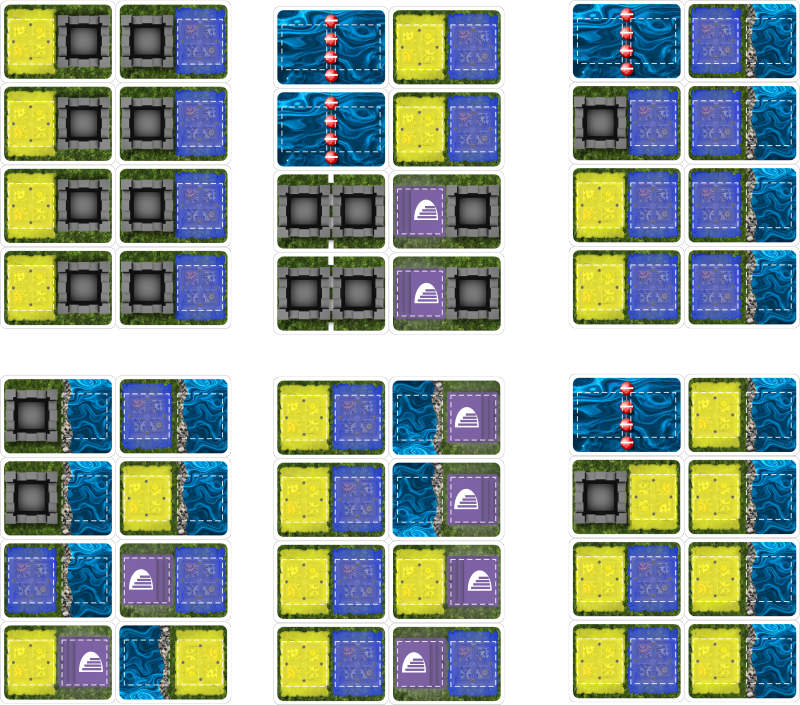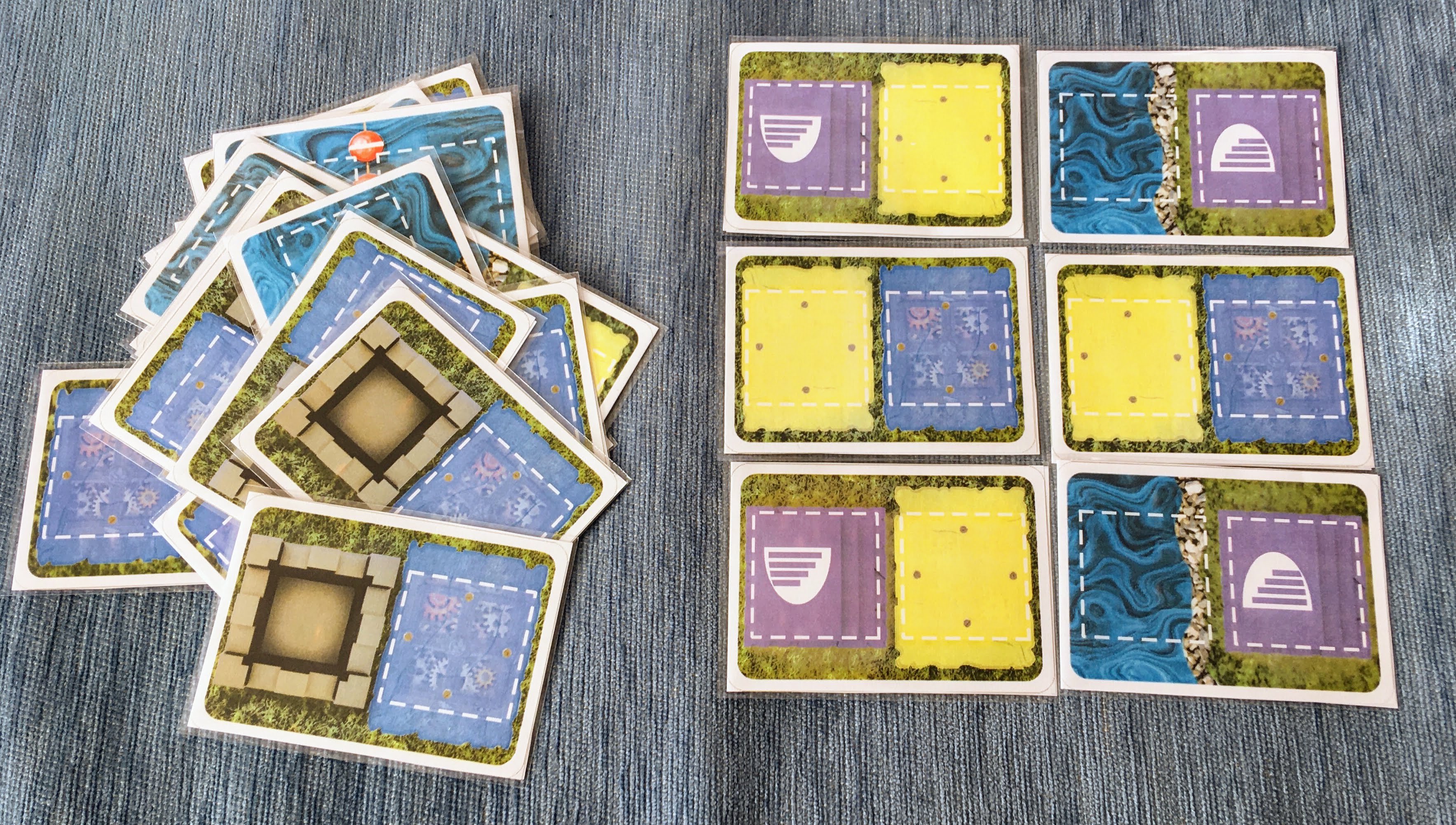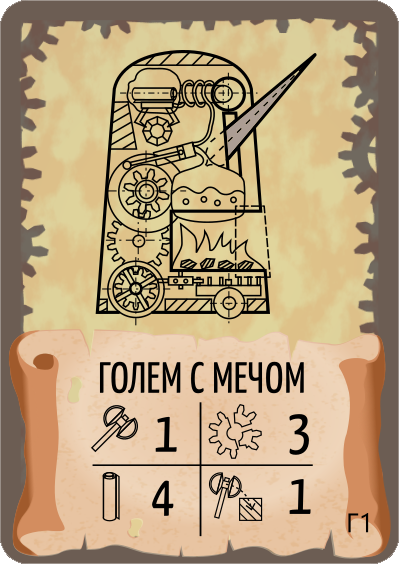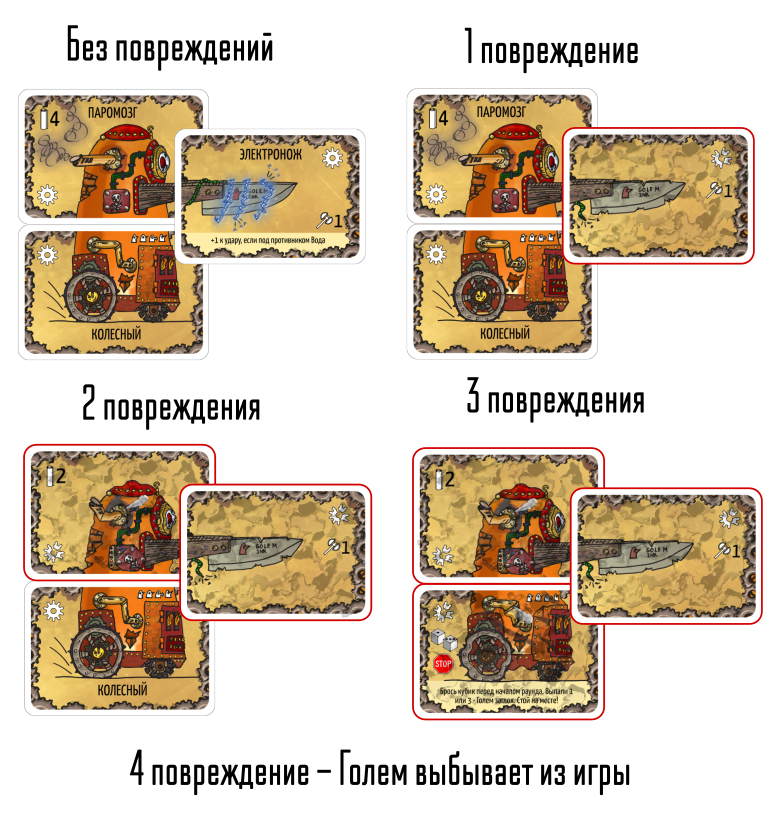Battle Golems from the cards. How we turned the game into the Parobot Card League
The continuation of this story . Now it’s not about the concept, but about how we are from this

those. the classic version in which the playing field itself, the elements on it, damage tokens were represented by “cutting” from cardboard and it was “expensive and rich” to make the card “engine” and content and reduce the number of “non-card” components to a minimum. In the terminology of computer games, these are “level design” and “character design”. But we also have an IT game about programming robots.
So in order. If earlier I talked about team cards in Scratch, now we will talk about replacing other components.
Playing field
Since in the game we have the arena itself, as well as three types of obstacles (indestructible, destructible, and water), it was decided to separate them. What we were supposed to move and collapse (barrels), we decided to do in the form of round acrylic tokens with stickers (at the same time it will be more convenient to move and turn over). The remaining components were distributed on 24 double-sided cards.

I only had to sacrifice the stairs (they now work as universal portals and entering one “door” you can exit anywhere where there is the same field. Now players can collect both classic 3x3 or 4x4 square levels and more complex and intricate configurations, including multi-story (or indoor). The photo shows an example of the level and appearance of the prototype, on which we work out the last nuances before sending the game to print.

A novelty (due to the possibilities of using barrels and the presence of a “flying” chassis for your Parobots) will be levels that were impossible to imagine in previous versions of the game. For example, a duel on a bridge of two wheeled robots, where a blow can destroy the bridge itself or an opponent or you can make it out.
Parobots Golems
In previous versions of the game, Golem Robot cards looked like this

And the damage was taken into account by special tokens of “broken” gears, which were laid out on top of them.
In the card version, it was decided that golems and their damage would "work" according to completely different mechanics. They puzzled for a long time over the balance (in order not to give the player “cheating” opportunities by combining the coolest components). Wherein:
1. The player must assemble his battle robot before the start of the battle, combining it from three components (and in the future we may add other "spare parts"): the chassis, the upper part - the "brains" and weapons. Each robot decided to leave three “lives” marked by whole gears. We developed two types of chassis, top and weapons for each player, which will differ in properties. For example, a missile chassis will allow you to "fly" above the water, and although the Armored Brain does not accommodate a large number of teams, it is less sensitive to damage.
2. With missed Blows, the player will have to decide how much of his robot will be damaged and what he is willing to sacrifice: the number of executed commands, additional weapons capabilities or movement.

To display damage to the player, it will be enough to turn over the corresponding card (or cards if you missed 2 units of Impact) to the side with a broken gear. When he turns over all three cards (3 missed units of Blow), and there remains the last chance - the next Blow his robot will not survive.
These decisions were made in order to go “to the card” format, and whether they will be successful or not, the players will already say. The game is now raising funds for the publication and I hope to see the light by the end of the year (or early next) and we really hope that the children will enjoy the new Golems-Parobots.
PS You can ask questions in the comments on the game, game design, etc., I will answer with pleasure.

those. the classic version in which the playing field itself, the elements on it, damage tokens were represented by “cutting” from cardboard and it was “expensive and rich” to make the card “engine” and content and reduce the number of “non-card” components to a minimum. In the terminology of computer games, these are “level design” and “character design”. But we also have an IT game about programming robots.
So in order. If earlier I talked about team cards in Scratch, now we will talk about replacing other components.
Playing field
Since in the game we have the arena itself, as well as three types of obstacles (indestructible, destructible, and water), it was decided to separate them. What we were supposed to move and collapse (barrels), we decided to do in the form of round acrylic tokens with stickers (at the same time it will be more convenient to move and turn over). The remaining components were distributed on 24 double-sided cards.

I only had to sacrifice the stairs (they now work as universal portals and entering one “door” you can exit anywhere where there is the same field. Now players can collect both classic 3x3 or 4x4 square levels and more complex and intricate configurations, including multi-story (or indoor). The photo shows an example of the level and appearance of the prototype, on which we work out the last nuances before sending the game to print.

A novelty (due to the possibilities of using barrels and the presence of a “flying” chassis for your Parobots) will be levels that were impossible to imagine in previous versions of the game. For example, a duel on a bridge of two wheeled robots, where a blow can destroy the bridge itself or an opponent or you can make it out.
Parobots Golems
In previous versions of the game, Golem Robot cards looked like this

And the damage was taken into account by special tokens of “broken” gears, which were laid out on top of them.
In the card version, it was decided that golems and their damage would "work" according to completely different mechanics. They puzzled for a long time over the balance (in order not to give the player “cheating” opportunities by combining the coolest components). Wherein:
1. The player must assemble his battle robot before the start of the battle, combining it from three components (and in the future we may add other "spare parts"): the chassis, the upper part - the "brains" and weapons. Each robot decided to leave three “lives” marked by whole gears. We developed two types of chassis, top and weapons for each player, which will differ in properties. For example, a missile chassis will allow you to "fly" above the water, and although the Armored Brain does not accommodate a large number of teams, it is less sensitive to damage.
2. With missed Blows, the player will have to decide how much of his robot will be damaged and what he is willing to sacrifice: the number of executed commands, additional weapons capabilities or movement.

To display damage to the player, it will be enough to turn over the corresponding card (or cards if you missed 2 units of Impact) to the side with a broken gear. When he turns over all three cards (3 missed units of Blow), and there remains the last chance - the next Blow his robot will not survive.
These decisions were made in order to go “to the card” format, and whether they will be successful or not, the players will already say. The game is now raising funds for the publication and I hope to see the light by the end of the year (or early next) and we really hope that the children will enjoy the new Golems-Parobots.
PS You can ask questions in the comments on the game, game design, etc., I will answer with pleasure.
All Articles